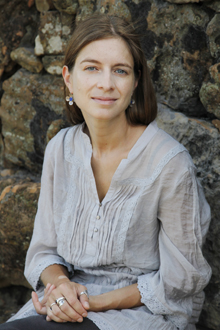Finding human decency in dangerous places
Correspondent Anna Badkhen says eating is the great equalizer
 Photo/Kael Alford
Photo/Kael AlfordAnna Badkhen
She is best known as a by-line from war-torn countries, but correspondent Anna Badkhen was riding her bicycle along the Massachusetts coast Tuesday -- taking a celebratory ride because October 12 was the publication date for her new book, “Peace Meals: Candy-Wrapped Kalashnikovs and Other War Stories".
Wednesday, October 13, from 7 to 9 p.m., she will speak about the book in Rapaporte Treasure Hall.
Badkhen, who was born in the former Soviet Union but now lives in Massachusetts, has reported from Iraq, Afghanistan, Somalia, Israel, the Palestinian Territories, Chechnya and Kashmir. Her reporting has appeared in the Boston Globe, the New Republic, Foreign Policy, the San Francisco Chronicle, the Christian Science Monitor, Frontline/World and other publications. Her new book describes the intimate but fleeting friendships and ordinary pleasures that have carried her through danger, deprivation and the strange experience of bearing witness to extreme forms of suffering.
Sharing a meal at the end of the day, says Badkhen, is the great equalizer. It is a vehicle she uses to tell stories of the humanity that underlies even the most grave circumstances. “In conflict, every meal is a feast of celebration for having survived another day in a war,” says Badkhen. “Eating is something we all do if we’re lucky.”
Eating, she points out, is not optional. Sitting around a table, “makes people three dimensional. They talk. They laugh. They fall in love and out of love. They quarrel. In the end, they eat. That is something we can all relate to. We can all relate to sitting down together.”
“In wars and in extreme situations,” says Badkhen, “we present ourselves at our worst and at our best.”
What struck her repeatedly during her extensive time reporting from war zones were the simple acts of human decency she witnessed among the people living under brutal circumstances.
In Baghdad in 2003, she was in a market with fellow foreign correspondent Charles Radin, then of the Boston Globe and now of Brandeis. “I was shopping for some spices for a dish that I like and I wanted to recreate at home. It was a very old market, and while we were waiting for the salesperson to grind up some spices, a pickpocket tried to steal from Charlie, reaching into his backpack. Charlie grabbed him by the wrist. We were immediately surrounded.”
Badkhen was afraid that the mob would turn on them since it was soon after the U.S. invasion of Iraq and tensions were high. Instead, she said, “to my absolute surprise, rather than hate us, they surrounded us and promised to stand guard while we finished shopping.” She remembers a woman stepping out from the crowd and apologizing to her in accented English, “I am so deeply sorry for what happened. I don’t want you to think that people in Baghdad are not hospitable to their guests.”
“I feel it is important to tell stories of people who are far away and largely voiceless,” Badkhen says. “There should be someone who gives voice to people who can’t speak for themselves.” She says she brings these otherwise voiceless people to the attention of readers in the United States, “for whom these people would otherwise remain stick figures. It is important to try to show people who do not know conflict or war intimately, how small the world is.”
Radin, the Globe correspondent who was almost pickpocketed while in a Baghdad street market with Badkhen, is now director of news and communications at Brandeis and will introduce Badkhen during her appearance, which is sponsored by the Social Justice Leadership Series and co-sponsored by the Schuster Institute for Investigative Journalism, the International Center for Ethics, Justice and Public Life and numerous other Brandeis departments and offices.
The mission of the SoJust series, according to Schuster Institute Director Florence Graves, is to bring to campus people who will talk about their work and how they found their path to that work.
"Peace Meals" is Badkhen’s second book. Her first was "Waiting for the Taliban: A Journey through Northern Afghanistan."
Categories: Humanities and Social Sciences, International Affairs





